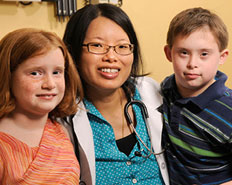Research
November 18, 2011
Full potential: Helping Down Syndrome children get the most out of life

Pediatrician Jeannie Visootsak, shown above with Emma and Daniel Harman, works with children with Down syndrome (DS) and their families to boost development and potential. (Photo by Jack Kearse)
Jeannie Visootsak—or Dr. Jeannie, as patients call her—is a developmental behavioral pediatrician, who directs the Down Syndrome Clinic that opened at Emory in 2003. The clinic works with 15 hospitals in the Atlanta metropolitan area and is often the first specialty care for Down syndrome (DS) that local families encounter.
"Our goal is to form a long-term relationship with the children and parents, help them look beyond the diagnosis, and be an advocate for them," Visootsak says. At the beginning, parents "may be overwhelmed and unsure of which direction to take. We start talking about development right away and what parents can do to help their children reach their full potential."
The first visit with a family begins with a review of the chromosome studies and sharing general information on DS. Children receive a full physical and developmental screening as well as a review of DS health care guidelines. They are given referrals to the state's early intervention program and to medical specialists.
"Each child is an individual with different strengths and challenges," says Visootsak. "But one thing is a given for all. They have a wide range of developmental delay. So early intervention is key," says Visootsak.
Some 20 percent of the clinic's population is Hispanic, and the clinic provides a full-time Spanish translator for those patients and families.
Just as important as the clinic's referrals to physical and developmental specialists is putting families in touch with community resources like the Down Syndrome Association of Atlanta, says Visootsak.
The largest database of the smallest chromosome
Emory's clinical and research efforts in Down syndrome continue to grow.
That research takes place in the School of Medicine's Department of Human Genetics. Geneticist Stephanie Sherman, for example, has spent more than two decades studying the causes and consequences of DS.
Over the years, she has amassed the largest Down syndrome database in the country, thanks to children and families who have participated in studies at Emory.
Current investigations are focusing on understanding the variability that results from having an extra chromosome 21. Why, for example, do only some children with DS have congenital heart or gastrointestinal defects? And what accounts for the large range of cognitive abilities among children with DS? The epidemiologic databank of interviews and clinical information along with a large biorepository of cell lines and DNA continues to be a major source for researchers trying to answer these questions.
Sherman hopes that targeted drug therapy and behavioral and educational interventions will soon become available to improve cognitive learning abilities for those with DS.
"Researchers have seen that drugs are working in animal models of DS to restore balance in the activities of the neurons in the brain and how they interact with each other," she says. "The question is, will they improve behavior and cognition in humans?"
Currently, the largest DS study at Emory (in collaboration with the Sibley Heart Center of Children's Healthcare of Atlanta and other national sites) is seeking to identify genetic and environmental factors that influence the susceptibility for congenital heart defects, such as atrioventricular septal heart defect (AVSD), in people with DS.
Complementing that effort, Visootsak is leading a NIH study to examine the neurodevelopmental outcomes of children with DS who have congenital heart defects, in particular AVSD. As these children increasingly survive cardiac surgery and live longer, the researchers want to better understand their early developmental trajectories (cognitive, motor, language and social) to design better early interventions to maximize potential.
Emory's clinic staff share a passion to have children with DS reach their fullest potential. "We're here to help them get the most out of life," says Visootsak.
This article was adapted from Emory Health magazine. Read the full story in the fall 2011 issue.
